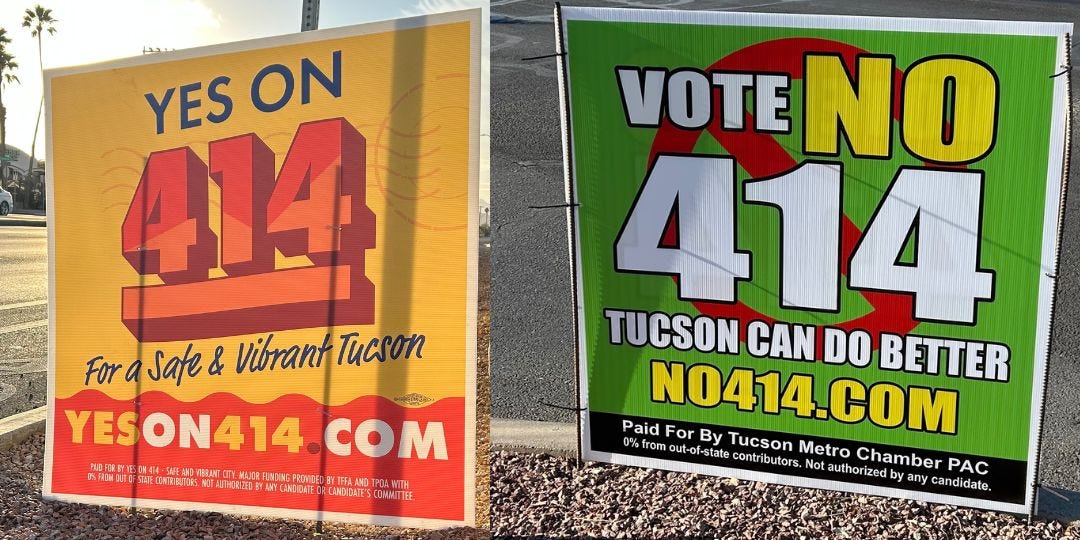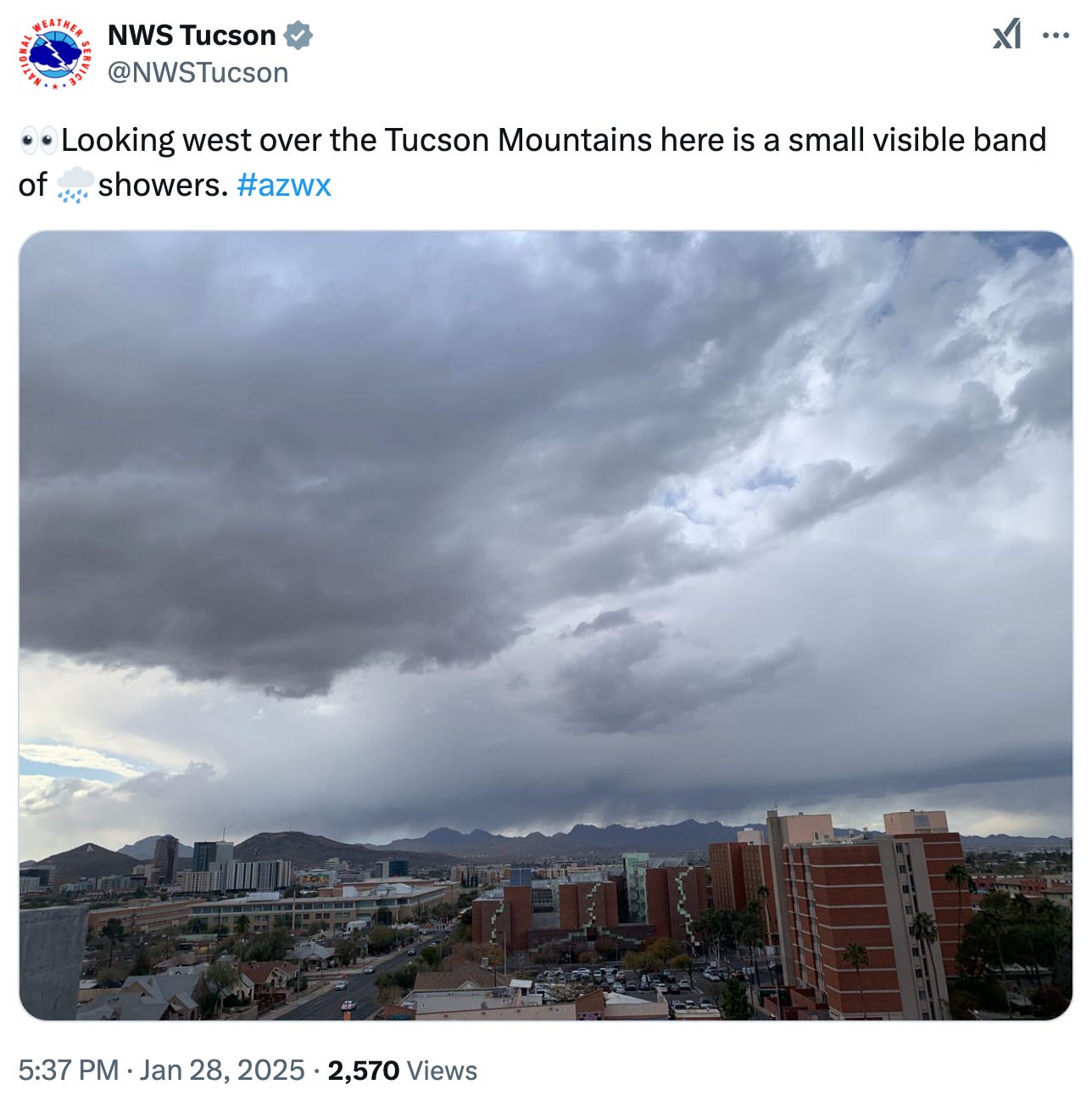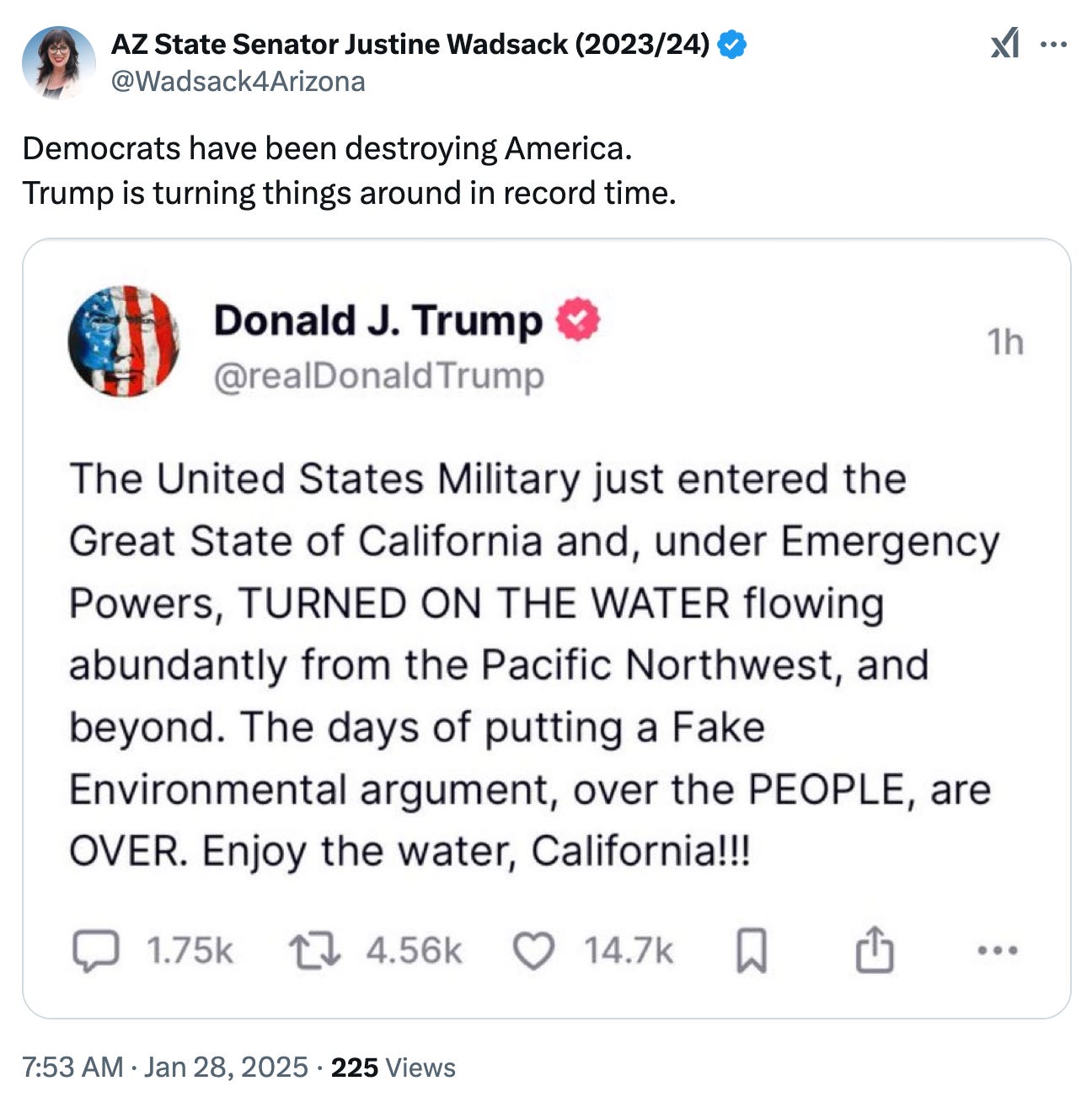Money rushes in
Prop 414 players … Grant confusion reigns … And do they not know how water works?
Every seasoned politico has a story of a politician who won their election running on a shoestring budget, upending the prevailing concept that money buys elections.
It’s an inspiring anecdote that David can still beat Goliath.
But that’s more of a fairy tale when it comes to ballot propositions where all the land must be blanketed with political signs and sometimes, expensive digital campaigns.
For Tucson’s upcoming Proposition 414, several political heavyweights have entered the fray, with the local police and firefighter unions backing the measure and the Tucson Metro Chamber using their PAC to try and kill the measure at the polls in March.
The half-cent sales tax increase, which goes before city voters in March, would raise an estimated $80 million per year for first responders and housing services.
The Yes on Prop 414 crowd
Pat Deconcini, whose family owns real estate holdings in Tucson, said he is supporting the measure for a number of reasons, including what he sees as a city overwhelmed by homelessness.
Some of his commercial tenants are struggling with homeless individuals on their property, sometimes requiring additional private security. But his larger concern is about lagging emergency response times. Those minutes matter when someone is experiencing a medical emergency, whether it’s a heart attack or an overdose, he said.
Proposition 414, he said, can give the Tucson police and fire departments the resources they desperately need to respond to emergencies faster, as well as offer more resources to unhoused families here in Tucson.
While campaign finance reports have not been submitted for either campaign - the next filing deadline is March - Treasurer Ana Murrufo of the Yes on Prop 414 campaign estimates they’ve raised about $90,000 so far.
A majority of their funding so far comes from the Tucson Fire Fighters Association and The Tucson Police Officers Association, she confirmed.
The two unions are backing a measure where two-thirds of the estimated $800 million raised by the half-cent tax increase over the next decade would go to the Tucson police and fire departments.
Tucson Fire Fighters Association President Clayton Black said the city has made strides in modernizing equipment and firehouses with Prop 101 in 2017, but there is more work to be done.
Calls to 911 continue to set year-over-year records, and staffing is down to historic levels, which hampers the ability for the fire department to answer calls in a timely fashion. The National Fire Protection Association puts that figure at five minutes from taking the 911 call to arriving on the scene, but Black says the department is struggling to meet those figures.
He said while the number of emergency calls the Tucson Fire Department responds to continues to grow, the overall personnel in the department is five to ten percent below historic highs.
In part, Black supports provisions in Prop 414 to establish new, smaller stations on the northwest and southside of Tucson, effectively putting resources where they see above-average call rates.
Another goal of Prop 414 is increasing the number of police officers (as well as community service officers), with a target of 1,200 sworn police officers.
The Tucson Police Officers Association is listed as a “major contributor” to the Yes on Prop 414 campaign, but did not respond to requests for comment.
There’s a lot of money at stake with Prop 414 and we’re hustling to make sure Tucson voters know what the deal is. Upgrade to a paid subscription and help us do it!
No on Prop 414
Tucson Metro Chamber President and CEO Michael Guymon says the chamber has historically supported measures that beef up core city services, including additional funding to the city’s police and fire departments. The chamber also supports active city programs, including the Tres Rios wastewater plan project, he said.
However, the Chamber commissioned a study to review Prop 414, as well as the city’s budget priorities. While city officials said the flat tax passed by the Legislature is costing the city roughly $40 million a year, Guymon is skeptical.
“Tucson is the only city raising the sales tax, that is kind of a red herring for us,” Guymon said.
Proposition 414 goes too far with an additional half-cent sales tax, raising the sales tax rate to 9.2 percent, which puts an undue burden on taxpayers and small business owners in Tucson, he said.
The Tucson City Council should instead be looking to tighten its belt, Guymon said, pointing to similar tightening the city did in 2012 and 2002 during other financial crises.
So far, the Tucson Metro Chamber has set aside $50,000 for the campaign, but Guymon expects that figure to increase with a number of groups pledged to support the No on Prop 414 campaign.
A second unrelated group, the Community Coalition to Stop Prop 414, is also collecting signatures against the measure. The group, which has ties to the Tucson chapter of the Democratic Socialists of America, does not seem at this time to be raising money for the effort.
As local officials sort through President Donald Trump’s executive actions, Pima County has identified roughly 12 grants worth approximately $68 million that were funded by two laws Trump targeted directly: the Bipartisan Infrastructure Investment and Jobs Act (IIJA) and the Inflation Reduction Act (IRA).
In a memo to the Pima County Board of Supervisors, County Administrator Jan Lesher said most of the local funding is tied to reimbursements for contracted work and county officials are reviewing their options before making any moves.
“The County will determine action once it receives and reviews related communication from each grant-issuing federal agency, it reviews the status of implementation and spending of each award, and it obtains a legal determination of the federal government’s ability to delay or impound disbursement of Congressionally appropriated funding,” she wrote.
We gave you a quiz yesterday about how headlines last week seemed so similar to the ones we saw at the start of Trump’s first term back in 2017.
The challenge was to figure out whether the headlines were new, or from eight years ago.
A bunch of you took the plunge!
As promised, here are the correct answers. Let’s see how many of you are A+ news readers and got them right.
These ones were a breeze for about 80% of readers:
"In exacting retribution, Trump aims at the future as well as the past" (2025)
"Trump aides want to hit Mexico, Canada with tariffs before talks" (2025)
"Foes of abortion embrace Trump; 'this has been a fantastic first week'" (2017)
But these headlines stumped a lot of readers:
"Democrats flip the script, eyeing debt limit to block Trump’s agenda" This headline was from 2025 and only 39% of readers got it right.
“First ‘sanctuary city’ caves to Trump demands” The correct answer was 2017 and it was an even split.
"Trump’s suspension of refugee program leaves advocates in turmoil but unsurprised" This was from 2025 and 51% got it right.
“Trump's energy emergency is a gift to fossil fuel firms. It's likely headed to court” The correct answer was 2025 and 56% got it right.
Then there were these three headlines that most readers got right, but a lot didn’t:
"Trump revives push to denaturalize US citizens" This headline was from 2025 and 74% got it right.
"What Trump’s flurry of executive orders means for science" The correct answer was 2025 and 69% got it right.
"Trump transition email shows initial effort to oust all inspectors general" The correct answer was 2017 and 62% got it right.
If you want to participate in the quizzes, polls, and other activities we offer to paid subscribers, upgrade today!
Still not clear: University of Arizona officials are sorting through the effects of the Trump administration’s pause on federal grants, and telling faculty to look for research funding from sources other than the federal government, the Arizona Daily Star’s Prerana Sannappanavar reports. On Monday, the White House budget office said the pause now covers most grants, loans and financial assistance, with a particular focus on programs that include DEI policies or deal with the Green New Deal.
A reprieve in sight: UA officials might see some relief, though. A federal judge temporarily blocked the pause on grant funding Tuesday afternoon, saying active grants should continue as before, but Trump officials could still keep their pause on new grants.
Confusion spreads: Officials throughout the state were in the same boat as the UA, the Arizona Republic’s Laura Gersony reports. Attorney General Kris Mayes called the expanded pause on funding a “blatant violation of federal law and we will not allow it to stand,” while school officials in Phoenix wondered whether they could still offer free breakfast and lunch to students. As for the rationale behind the pause, here’s how the acting director of the Office of Management and Budget put it in a written statement.
“The use of federal resources to advance Marxist equity, transgenderism and green new deal social engineering policies is a waste of taxpayer dollars that does not improve the day-to-day lives of those we serve,” the statement read.
It just keeps coming: The U.S. Department of Justice halted legal orientation programs for detained migrants, including at detention centers in Arizona, Arizona Public Media’s Paola Rodriguez reports. Three legal access groups said they were shut out of detention centers on Friday, stopping them from providing basic legal information to migrants inside.
“How can you expect someone to fight their own case in an extremely traumatizing situation with no understanding of the process and due to the conditions of their detention have no access to the information that's necessary to prove their case?” Laura St. John, the legal director at the Florence Immigrant and Refugee Rights Project, said. “That's not justice.”
Preparing for the worst: Amid the rising tide of news stories about an immigration crackdown, the Tucson Unified School District is working on policies for school staff when immigration officers arrive, the Star’s Jessica Votipka reports. The plan is to require officers to present a judicial warrant or court order, along with the officer’s identification. If TUSD’s legal team says the documents are valid, school staff will let the officer enter the school.
“We’re just not going to let anybody come inside a school,” says Jennifer Eckstrom, president of the TUSD governing board.
File this under “the blind leading the blind.” Former Tucson-area lawmaker Justine Wadsack came out strong in support of Trump’s claim that the U.S. military somehow “turned on the water” from the Pacific Northwest.









